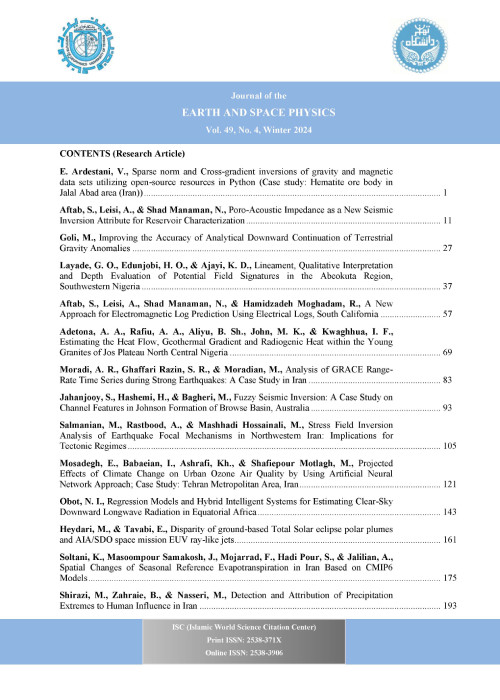Real-time hybrid orbit determination using satellite to satellite tracking observations
Author(s):
Abstract:
Three-dimensional position measurements by Global Positioning System (GPS) provide purely geometrical estimate of Low Earth Orbiters (LEOs) positions. It provides uninterrupted tracking of the LEOs in three spatial dimensions or the so-called kinematic orbit. This solution relies heavily on the observations. High frequency observation noise, outlying observations and low redundancy number of measurements are the main obstacles to the purely observed or the so called kinematic orbit. on the other hand dynamic orbit is not ideal orbit due to the mis-modeling of the assumed forced filed. Introducing the equation of motion in terms of a dynamic process helps us to overcome the aforementioned problems to a great extent. Therefore the equation of satellite motion based on the forces acting on a satellite provides dynamic solution which helps to fix and reduce the stated problem of purely geometric solution. Combination of both the kinematic and dynamic methods of state vector determination is used with carefully selected relative weighting in the hybrid methods. At first glance, the dynamic orbit adjusts the fewest parameters, preserving maximum data strength, and yielding the lowest formal error, error due to observations noise, even in low observation condition. In the other side, the dynamic orbit can suffer from a large systematic error due to inefficient and imperfect introduced models which produce accumulative and frequent adverse effects on the dynamic orbit. The kinematic orbit eliminates modeling error, but the orbit is determined entirely from the observations, data strength is depleted, and the formal error due to observations can grow largely. The hybrid orbit optimally combines the two techniques to achieve the desired output. In other words, the final goal of hybrid methods will determine what is the optimal combination which leads us to the lowest overall state vector errors and estimated dynamic models parameters. If the vector of parameters and observations are related linearly, several powerful linear estimators can be applied for estimation of the unknown parameters. Linearization of the nonlinear models is the most frequently used scheme for using theoretically and computationally well-developed linear estimators Orbit determination problem is well-known example of the highly nonlinear engineering problems. In general, observations and augmented equation of motion are nonlinear with respect to time and parameters. Because of highly nonlinearity conditions in orbit determination problem, Extended Kalman Filter (EKF) has been chosen as appropriate filter rather than Standard Kalman filter. For numerical evaluation of the proposed method, GPS, P-code observations of the CHAllenging Minisatellite Payload (CHAMP) and Gravity Recovery And Climate Experiment (GRACE) twin satellites have been used. The proposed method will be applicable for phase observations as well as code observations. On the other side, capability of more precise code observations of upcoming global navigation satellite system like Galileo, was another motivation for choosing code observations. The final results are compared with the Rapid Science Orbits of CHAMP and GRACE twin satellites, disseminated by Geo Forschungs Zentrum Helmholtz center Potsdam. High quality of the hybrid solution proves the efficiency of the proposed method and the proposed method achieves nearly 4 times better noise level than the purely kinematic method in the aforementioned case study.
Keywords:
LEOs , SST , Real , time orbit , Kalman filtering , Hybrid orbit
Language:
Persian
Published:
Journal of the Earth and Space Physics, Volume:41 Issue: 3, 2015
Page:
413
magiran.com/p1489957
دانلود و مطالعه متن این مقاله با یکی از روشهای زیر امکان پذیر است:
اشتراک شخصی
با عضویت و پرداخت آنلاین حق اشتراک یکساله به مبلغ 1,390,000ريال میتوانید 70 عنوان مطلب دانلود کنید!
اشتراک سازمانی
به کتابخانه دانشگاه یا محل کار خود پیشنهاد کنید تا اشتراک سازمانی این پایگاه را برای دسترسی نامحدود همه کاربران به متن مطالب تهیه نمایند!
توجه!
- حق عضویت دریافتی صرف حمایت از نشریات عضو و نگهداری، تکمیل و توسعه مگیران میشود.
- پرداخت حق اشتراک و دانلود مقالات اجازه بازنشر آن در سایر رسانههای چاپی و دیجیتال را به کاربر نمیدهد.
In order to view content subscription is required
Personal subscription
Subscribe magiran.com for 70 € euros via PayPal and download 70 articles during a year.
Organization subscription
Please contact us to subscribe your university or library for unlimited access!


